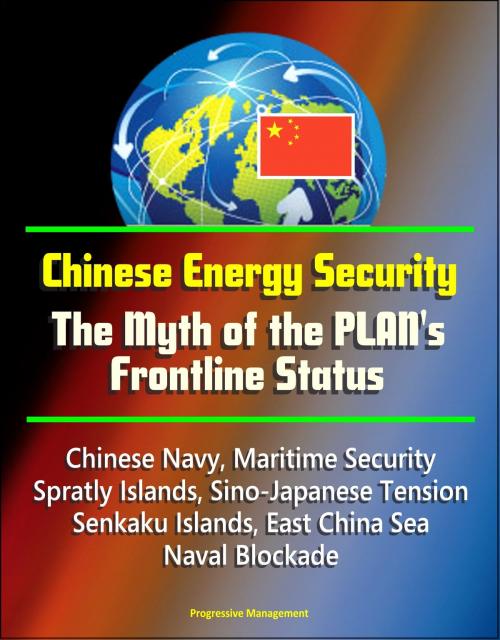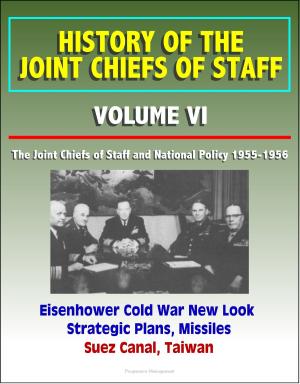Chinese Energy Security: The Myth of the PLAN's Frontline Status - Chinese Navy, Maritime Security, Spratly Islands, Sino-Japanese Tension, Senkaku Islands, East China Sea, Naval Blockade
Nonfiction, History, Asian, China, Military, United States| Author: | Progressive Management | ISBN: | 9781310810381 |
| Publisher: | Progressive Management | Publication: | February 25, 2014 |
| Imprint: | Smashwords Edition | Language: | English |
| Author: | Progressive Management |
| ISBN: | 9781310810381 |
| Publisher: | Progressive Management |
| Publication: | February 25, 2014 |
| Imprint: | Smashwords Edition |
| Language: | English |
This monograph examines the dynamics of China's energy security dilemma and the role of the People's Liberation Army Navy (PLAN). Following this, PLAN development is discussed, and its future role in regional security is hypothesized. This report argues that it is domestic market inefficiencies and poor management practices that pose the greatest threat to China's energy security. Further, less and less of Chinese energy imports are making their way to the country by sea; thus the PLAN actually has a minimal role to play. Given these realities, Chinese fears of a naval blockade that deprives it of energy supplies as well as American confidence that this is a realistic strategic option in the event of hostilities are implausible. In addition, Beijing's desire to develop aircraft carriers and other high-tech naval capabilities combined with its contribution to the anti-piracy mission in the Gulf of Aden have led many analysts to erroneously conclude that China seeks to engage in global power projection like the United States. However, the focus of the PLAN will remain regional and on asymmetric capabilities, namely, the effective use of submarines and other undersea devices that ultimately seek to deter American and possible Japanese involvement in a conflict over Taiwan and/or in the South China Sea, such as the Spratly Islands, which China views as inalienable parts of its territory. Although China's interests are expanding and becoming more international in nature, recovering from the century of humiliation and ensuring domestic legitimacy remain the top priorities of China's leadership.
A key aim of this work is to demonstrate that the greatest threat to Chinese energy security is domestic market inefficiencies and perverse incentive structures, thus clearly highlighting the "myth" of the PLAN's frontline status. As the Sino-U.S. relationship continues to assume greater strategic importance, energy security is a component that Washington and Beijing can simply not afford to get wrong. As opposed to dedicating substantial resources to planning for conflict scenarios that are based upon fundamentally flawed conceptions, namely, naval blockades designed to starve China of energy resources or strategies to preempt or circumvent one of these blockades, both parties would be much better served by focusing on sound economics and distribution/ refining practices. Cooperation in this sphere is not only a much more immediate and realistic option; it also deals with the root of the dilemma, something which is clearly in the interests of the United States as well as China.
In addition to the China paper, this unique collection of American military documents provides a special view of recent Chinese military and policy developments. Contents: China Shaping the Operational Environment - A Disciple on the Path of Deception and Influence * The "People" in the PLA: Recruitment, Training, and Education in China's 80-Year-Old Military * China's Maritime Quest * The PLA At Home and Abroad: Assessing The Operational Capabilities of China's Military * Arms Sales To Taiwan: Enjoy The Business While It Lasts * China's Role In The Stabilization Of Afghanistan * The Coming of Chinese Hawks * Turkey and China: Unlikely Strategic Partners. This ebook also includes the annual U.S. intelligence community worldwide threat assessment in Congressional testimony by Director of National Intelligence James R. Clapper Jr.
This monograph examines the dynamics of China's energy security dilemma and the role of the People's Liberation Army Navy (PLAN). Following this, PLAN development is discussed, and its future role in regional security is hypothesized. This report argues that it is domestic market inefficiencies and poor management practices that pose the greatest threat to China's energy security. Further, less and less of Chinese energy imports are making their way to the country by sea; thus the PLAN actually has a minimal role to play. Given these realities, Chinese fears of a naval blockade that deprives it of energy supplies as well as American confidence that this is a realistic strategic option in the event of hostilities are implausible. In addition, Beijing's desire to develop aircraft carriers and other high-tech naval capabilities combined with its contribution to the anti-piracy mission in the Gulf of Aden have led many analysts to erroneously conclude that China seeks to engage in global power projection like the United States. However, the focus of the PLAN will remain regional and on asymmetric capabilities, namely, the effective use of submarines and other undersea devices that ultimately seek to deter American and possible Japanese involvement in a conflict over Taiwan and/or in the South China Sea, such as the Spratly Islands, which China views as inalienable parts of its territory. Although China's interests are expanding and becoming more international in nature, recovering from the century of humiliation and ensuring domestic legitimacy remain the top priorities of China's leadership.
A key aim of this work is to demonstrate that the greatest threat to Chinese energy security is domestic market inefficiencies and perverse incentive structures, thus clearly highlighting the "myth" of the PLAN's frontline status. As the Sino-U.S. relationship continues to assume greater strategic importance, energy security is a component that Washington and Beijing can simply not afford to get wrong. As opposed to dedicating substantial resources to planning for conflict scenarios that are based upon fundamentally flawed conceptions, namely, naval blockades designed to starve China of energy resources or strategies to preempt or circumvent one of these blockades, both parties would be much better served by focusing on sound economics and distribution/ refining practices. Cooperation in this sphere is not only a much more immediate and realistic option; it also deals with the root of the dilemma, something which is clearly in the interests of the United States as well as China.
In addition to the China paper, this unique collection of American military documents provides a special view of recent Chinese military and policy developments. Contents: China Shaping the Operational Environment - A Disciple on the Path of Deception and Influence * The "People" in the PLA: Recruitment, Training, and Education in China's 80-Year-Old Military * China's Maritime Quest * The PLA At Home and Abroad: Assessing The Operational Capabilities of China's Military * Arms Sales To Taiwan: Enjoy The Business While It Lasts * China's Role In The Stabilization Of Afghanistan * The Coming of Chinese Hawks * Turkey and China: Unlikely Strategic Partners. This ebook also includes the annual U.S. intelligence community worldwide threat assessment in Congressional testimony by Director of National Intelligence James R. Clapper Jr.















